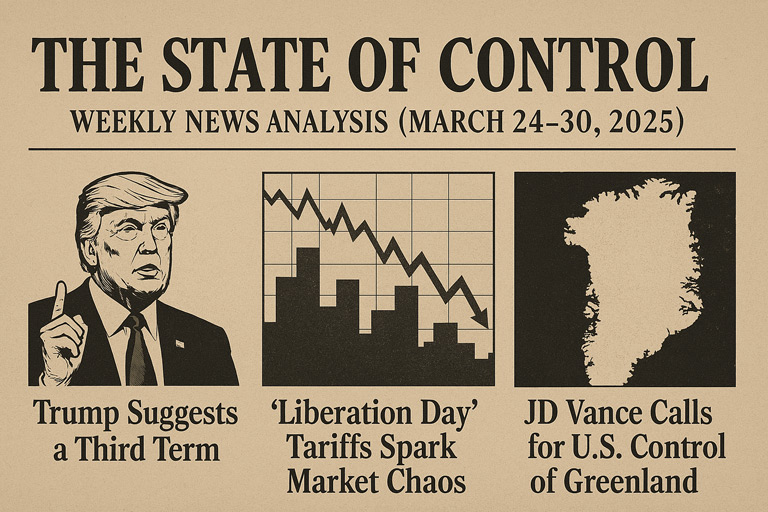
As political tensions rise and economic instability mounts, last week revealed a trio of powerful headlines that expose the shifting nature of American power—both at home and abroad. A sitting president publicly flirted with a breach of constitutional precedent, sweeping tariffs sent global markets into a tailspin, and the Arctic was suddenly thrust into the spotlight with a revived American claim to Greenland.
Each of these events reflects a more significant trend—governments consolidating authority, rebranding control as freedom, and projecting dominance under the banner of patriotism. Let’s break down the three stories shaping the week.
Trump Suggests a Third Term: “I’m Not Joking”
“I’m Not Joking”: Trump Says He Could Seek Third Term – The Guardian
President Donald Trump ignited political firestorms once again with a statement many initially dismissed as bluster—until he clarified that he “wasn’t joking.” The comment at a rally in Texas suggested that Trump may consider seeking a third term in office. While the 22nd Amendment clearly limits presidents to two terms, Trump’s comments signal something more troubling than mere political theater: a “Constitutional Crisis.”
The notion of a third term, a concept unseen in the post-FDR era, would necessitate either a constitutional amendment or a bold circumvention of legal precedent. Despite its legal feasibility, the mere suggestion plants a seed—a trial balloon to gauge the public's tolerance for power when it’s veiled in the allure of strength or stability. And the Right embraced it...
Some of Trump’s allies quickly downplayed the remark, framing it as typical rhetorical flair. Still, the lack of pushback from his base and the deafening silence from many within his party are more telling than the statement itself. The normalization of the idea—no matter how implausible—is a shift in the Overton window. Once considered unimaginable, lifelong leadership is now something being “floated.”
It tests public resistance, media framing, and constitutional elasticity.
Now, imagine if President Obama or Biden made the same statements…
"Liberation Day" Tariffs Spark Market Chaos
Financial Times – “Stocks tumble ahead of Trump’s ‘liberation day’ tariffs”
Simultaneously, Trump’s team rolled out a sweeping set of tariffs on what they dubbed “Liberation Day,” a supposed reclamation of American economic sovereignty. The move imposed new import duties on various Chinese, European, and South American goods—everything from electronics to textiles.
The announcement rattled global markets. The Dow dropped nearly 900 points in a single day. European and Asian markets followed suit. Commodity prices surged. Investors scrambled to reassess supply chains and inflation forecasts.
What was pitched as economic nationalism quickly became economic shock therapy.
These new tariffs, added to an already precarious post-pandemic recovery, pose a threat to raise consumer prices across the board. Small businesses reliant on affordable imports are likely to bear the brunt of the costs. For working-class families, the ripple effects could mean higher prices on essential goods and reduced access to affordable products. All of this without a reduction in income taxation, making this an unnecessary burden on the American public.
Despite the negative impact, the administration has pushed the narrative that tariffs protect American jobs and punish foreign manipulation. Yet economists warn that this type of economic brinkmanship could push the global economy toward recession—mainly if affected nations introduce retaliatory tariffs.
It seems Liberation Day may be a celebration for political strategists, but it could begin a new economic storm for regular citizens and markets.
JD Vance Calls for U.S. Control of Greenland
The Guardian – “Trump news today: VP Vance says US must take control of Greenland”
Rounding out the week’s developments was a surprise geopolitical declaration from Vice President JD Vance, who made waves by stating that the United States “must take control of Greenland” to secure national interests and push back against Chinese and Russian influence in the Arctic.
The comment, made during an interview on a conservative news outlet, reignited a long-dormant ambition previously floated during Trump’s first term—one that was widely ridiculed then. However, it appears the idea has been repackaged as a matter of national security rather than real estate speculation.
Vance argued that Greenland’s vast mineral resources, geographic position, and proximity to critical Arctic shipping routes make it a strategic necessity. He suggested that the U.S. should assert more significant influence or even “stewardship” over the territory to prevent encroachment by rival superpowers.
However, the comments reflect a growing trend among U.S. leadership: positioning American expansionism not as a conquest but as a defense. What once would have been considered an international overstep is now pitched as protection—of resources, democracy, or national sovereignty.
Still, the comments reflect a growing trend among U.S. leadership: positioning American expansionism not as a conquest but as a defense. What once would have been considered an international overstep is now pitched as protection—of resources, democracy, or national sovereignty.
Whether or not Vance’s remarks become official policy, they expose a willingness to reassert American dominance on the global stage through forceful influence, if not outright control.
With the push to acquire Mexico and Canada, the current regime seems poised to reinstitute the North American Union under a new guise.
The Bigger Picture: Power Consolidation in Real-Time
Taken individually, each of these stories is dramatic enough. But together, they form a clear picture: a nation amid political transformation, one where power is being consolidated under the banner of patriotism and strength.
When a sitting president openly discusses violating constitutional term limits, it's not just a headline—it’s a threat and a step toward what our Founders warned us about: Tyranny. When sweeping economic policies are rolled out with catchy names but no safeguards for citizens, it’s not policy—it’s manipulation. And when government officials propose taking over foreign land under the pretext of competition, it’s not a strategy—it’s imperialism.
We are witnessing the repackaging of authoritarian tendencies in the language of liberation and security.
These moves may resonate with voters disillusioned by decades of broken promises and foreign entanglements. But history shows that consolidation of power rarely stops at the rhetoric. It builds slowly—through economic levers, legal ambiguities, and cultural normalization. By the time the public fully grasps the scope of the shift, the machinery is already in motion.
Last week was not an aberration. It was a preview.
For a quick recap, listen to this week's news in verse!


